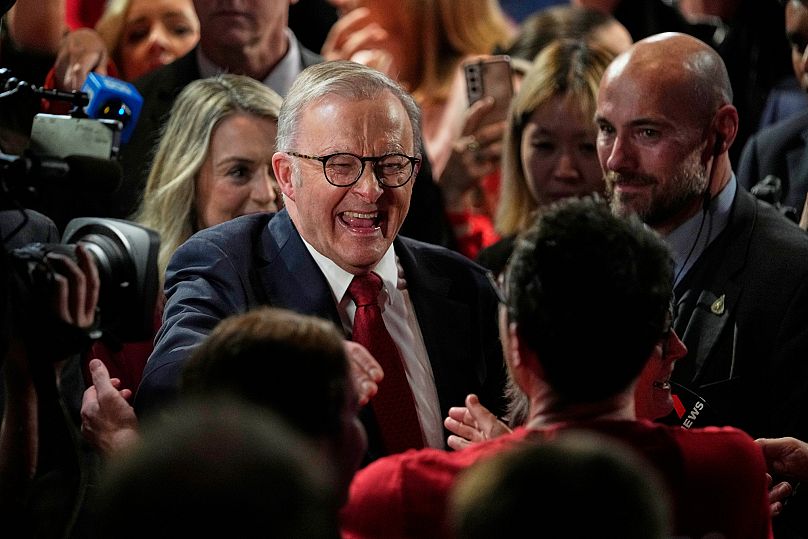Australian Prime Minister Anthony Albanese's Labour Party has been re-elected for a second consecutive three-year term.
"Today the Australian people have voted for Australian values. For fairness, aspiration and opportunity for all. For the strength to show courage in adversity and kindness for those in need," Albanese said in his winning speech on Saturday.
As vote counting continued, Albanese's Labour Party government was on track to win at least 85 seats in the 150-seat House of Representatives, the lower chamber where parties need a majority to form an administration.
Opposition leader Peter Dutton, who leads the conservative Liberal Party and lost his own seat in parliament in Saturday's election, conceded defeat. "We didn't do well enough during this campaign, that much is obvious tonight, and I accept full responsibility for that," he said.
Albanese will now be the first Australian leader to win consecutive elections since John Howard in 2004.
Prior to this election, Labour held a slim majority of 78 seats in the 151-seat House of Representatives, which is being reduced to 150 in the next parliament due to redistributions.
A loss of more than two seats would likely force Labour to attempt to form a minority government with unaligned lawmakers.

Key issues in the election
The major issues in the election campaign have been energy policy and inflation, with both major parties being in agreement that the country faces a cost of living crisis.
The conservative Liberal Party has blamed inflation on government waste and increased interest rates, pledging to scrap more than one in five public service jobs to reduce government spending.
This led to the Labour Party branding the opposition leader "DOGE-y Dutton", in reference to a similar stance held by US President Donald Trump and the Elon Musk-led Department of Government Efficiency (DOGE).
Both parties were in agreement that the country should reach net-zero greenhouse gas emissions by 2050, though Dutton has argued in favour of relying on nuclear power rather than renewable energy sources, supporting that it would lead to lower electricity costs. Australia does not currently have nuclear power plants.
The election also took place against a backdrop of what both sides of politics describe as a cost of living crisis.
Food insecurity affected 3.4 million homes in the 27 million-person nation last year, according to Foodbank Australia, the largest food relief organisation in the country.
In other words, Australians were either eating less or missing meals or worried about running out of food before they could afford to buy more.
In February, the central bank lowered its benchmark cash interest rate to 4.1%, a quarter percentage point decrease, signalling that the worst of the financial difficulties were over.
While the Albanese government pointed to relations with China improving during its first term, removing a number of trade barriers that had cost Australian exporters an estimated 20 billion Australian dollars (€11.37 billion) per year.
When it came to the purchase of homes, both campaigns promised they would introduce policies that would assist first-time home buyers in entering a property market many have been priced out of.







